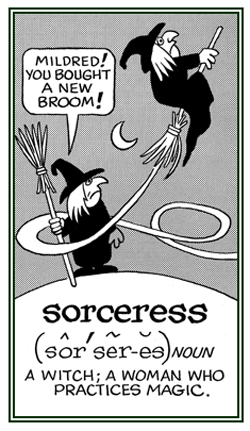-ess
(Greek -issa > Late Latin -issa > Old French -esse > Middle English -esse: a suffix that forms nouns meaning a female +++, as in lioness, tigress, heiress, hostess, and sculptress)
When -ess is added to a noun ending in -tor, -ter, the vowel before r is generally elided (eliminated or left out), as in actress (actor + -ess); and such a derivative with the ending -tress (often equivalent to French
In Middle English many words in -esse were adopted from French; such as, countess, duchess, mistress, and princess, or formed on nouns in -er; such as, enchantress and sorceress.
The suffix -ess is diminishing from English usage, with trends or tendencies toward avoiding any unnecessary references to gender or sexual categorizing (feminine or masculine.
The suffixes -er and -or are no longer gender-specific in modern English: an author or manager, like a doctor or writer, may be male or female, so the words authoress and manageress are considered redundant.
Some -ess words remain in use; for example, heiress and actress, although actor is being used more often now for both men and women.
2. The wife or widow of a peer.
2. A religious house governed by a prior or prioress, often dependent upon an abbey.
2. A woman predictor or a woman soothsayer.
3. The chief spokeswoman of a movement or a cause.



